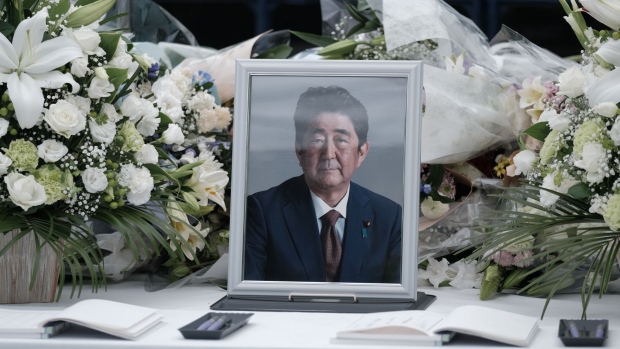Sep 26, 2022
Japan Holds Divisive State Funeral for Former Prime Minister Abe
, Bloomberg News

(Bloomberg) -- Japanese political leaders remembered former Prime Minister Shinzo Abe at a state funeral as a statesman who steadily led the country during his record run as premier, amid domestic opposition to the event that has undermined support for the current prime minister.
About 4,300 people including US Vice President Kamala Harris, world leaders, dignitaries and members of Abe’s ruling Liberal Democratic Party attended the event Tuesday at the Budokan arena in central Tokyo under tight security. The somber ceremony, watched over by a phalanx of police and a military honor guard, was Japan’s first state funeral for a former prime minister since 1967 and came more than two months after the country’s longest-serving premier was assassinated on the campaign trail by a man with a homemade gun.
Abe, who died at the age of 67, was a defining and sometimes divisive figure as the country navigated economic stagnation and China’s rise during his two terms, from 2006-2007 and 2012-2020. He was a security hawk, a fiscal dove, a defender of Japan’s alliance with the US and an advocate for maintaining the postwar global order.
Legacy of Abenomics to Live Beyond Its Tragically Shot Architect
Abe’s wife Akie carried the cremated remains of the former prime minister into the venue, bowing to the current leader Fumio Kishida as cannons fired off military salutes outside.
“Who could ever have imagined that such a day would come,” Kishida said at the funeral. “Prime Minister Abe, you were a person who we needed to live much longer.”
Outside the venue, thousands of people -- many who broke down in tears -- placed flowers at a memorial set up nearby for the public to honor Abe. The line at one point stretched about 1.7 kilometers (1 mile), the Yomiuri newspaper reported.
There were also scattered protests around Tokyo, including one a few kilometers away from the Budokan, where scores of people held placards declaring their opposition to the state funeral and admonished the government for dispensing the honor upon the former premier.
Kishida, whose decision to spend 1.7 billion yen ($12 million) on the service for his former boss has met with growing anger as households grapple with ballooning food and fuel prices. Investigations linking Abe and his LDP to a religious sect whose founder was convicted in the US of tax fraud further fueled opposition.
These factors have contributed to a tumble in voter support for Kishida’s cabinet to its lowest levels since he took office a year ago, and risk distracting from his policy objectives of reducing economic disparities and bolstering Japan’s defenses.
Abe’s suspected killer told police he was motivated by a grudge over his association with the group commonly known as the Unification Church. The gunman blamed the church for taking massive donations from his widowed mother decades ago and driving his family into poverty.
Surveys show about three in five respondents overall were opposed to the state funeral, though those in their teens and twenties tend to support it.
The South Korean-based church has a long list of court judgments against it in Japan over its fundraising methods. For its part, the church has said it took steps more than a decade ago to curb “excessive actions” by its members.
Kishida has sought to portray the funeral as an opportunity for diplomacy, planning talks with 30 top officials including the US vice president, Indian Prime Minister Narendra Modi and Australian Prime Minister Anthony Albanese. Canada’s Prime Minister Justin Trudeau, who was to have been the only Group of Seven leader to make the trip, canceled his visit to deal with the aftermath of Hurricane Fiona.
Attendance was lower than the 6,000 initially estimated by the government, with many opposition politicians opting to stay away. The Emperor did not attend, though his brother, Crown Prince Akishino and six other members of the Imperial household took part, in line with tradition.
Members of the imperial family led the way in placing white flowers at a long table on a stage beneath a portrait of Abe. Abe’s family, Japanese political leaders and representatives from abroad, including Harris, then followed.
Surrounding roads were closed to regular traffic and guests driven in buses to the venue amid the heightened security following criticism of the failure to prevent Abe’s murder, which last month prompted the head of the police agency to resign. Tens of thousands of police, many of them dispatched from other areas of the country, were on patrol in the capital, according to the Tokyo Shimbun newspaper.
“Prime Minister Abe, you spoke every day of your strong will to create a Japan where tomorrow is better than today and where young people can have hope,” former Prime Minister Yoshihide Suga, who served as Abe’s right-hand man for nearly eight years, said at the funeral.
Suga recalled how the two of them went to a grilled chicken restaurant in Tokyo and he tried to persuade Abe to make another run at leadership after his first term came to an end in 2007, as his chronic ulcerative colitis worsened. It was an affliction that Abe again blamed when he ended his second term as leader in 2020, to be replaced by Suga.
Persuading Abe to return to the leadership was “the greatest achievement of my life,” Suga said. “I will always remember it with pride.”
(Updates with quotes.)
©2022 Bloomberg L.P.






